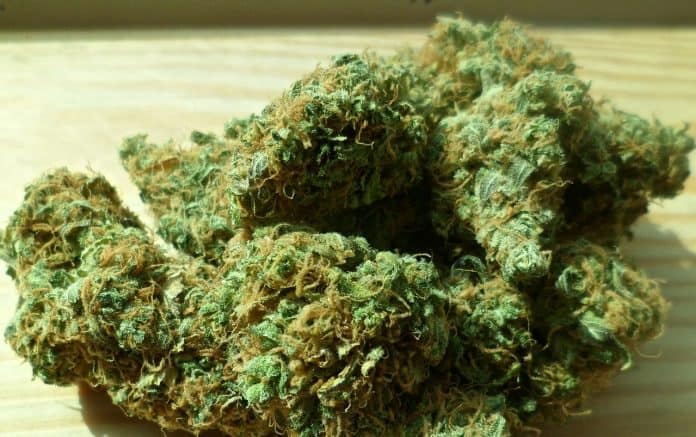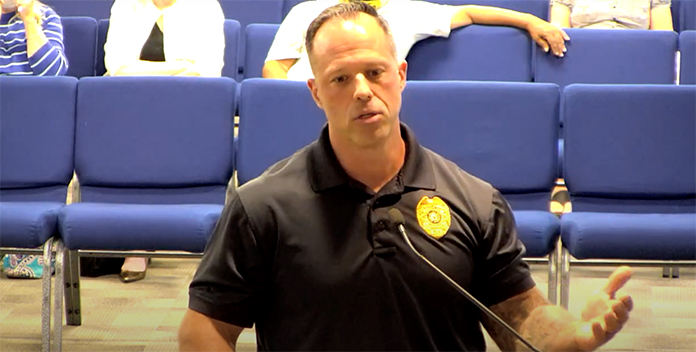
HOWELL – Residents recently voiced their concerns and support about the possibility of having cannabis businesses in Howell and where they should be zoned to the members of the Township Council.
A special meeting was held where the council to received public feedback from the community regarding the extensive topic.
Back in November, New Jersey residents voted to legalize adult use of marijuana. State officials had given municipalities until August 21 to pass ordinances to prohibit or permit marijuana businesses.
Within Monmouth County, 65.6 percent of residents voted to approve legalization of marijuana, and 34.4 percent voted against. For Howell, 63.39 percent voted to legalize it.
Despite the votes, council members voted ‘yes’ on August 21 to prohibit marijuana businesses in the town. However, they reassured residents that the ban would be temporary to give the council more time to properly zone and choose where the businesses should be in Howell.
Before the ordinance was adopted, many residents stated that the legalization was a “missed opportunity.”
The special meeting opened discussion for residents on the issue as well as allowing town officials to comment and give a response.
“There are some members here that I know will speak on both sides of it (cannabis issue). But our intent is to hear all angles so the council can form the best policy as to what we want to allow, what we don’t want to allow, and what areas of town we want to allow it in,” Township Manager Brian Geoghegan said.
“The discussion is how recreational cannabis and/or medical cannabis should be regulated, zoned and permitted for land use purposes in Howell. So, that’s what we want to talk about tonight,” Mayor Theresa Berger said.
Lifelong resident Howell Police Chief Andrew Kudrick was asked to provide insight on the issue and wanted to speak about the possible effects of having cannabis businesses on law enforcement and policing of the community.
When looking into cannabis cultivation operations in other states, Kudrick said, “there were no issues at all. Security is airtight (at facilities), the businesses are very regulated and the business owners are in tune with the community.”
“We’re more concerned about the DWI side of it, driving while under the influence. Making it easier for people to have access to those materials that lead to DWIs. But we have liquor stores in town, those are intoxicating substances. I think this is something we’re just going to have to accept in New Jersey and work with it the best that we possibly can,” Kudrick said.
When asked about the surveillance and security of marijuana businesses, Kudrick said the security systems can be compared to any bank or other businesses.
“I know these business owners take it very seriously because they know they are an easy target. But other than that, it has not been reported to me that there was a rise in crime, vandalism, whatever it may be, that would draw police attention or police resources to this business,” Kudrick said.
Resident Ed McNamee, the owner of Merrick Farm in Farmingdale, said residents could just go to neighboring towns to get weed from medical marijuana dispensaries and retail cannabis operations.

“Anybody can go ahead and drive to other places and get it. They can come home and smoke it at their house. So, you can’t prevent it from happening because the law says you are going to have it. The question is do you want to be involved somehow?” McNamee said.
He also stated that the town would benefit from the fees that would be paid by the operators. McNamee said he’s interested in creating a cannabis cultivation operation on property in Howell and explained the difference in revenue between farming and cannabis cultivation.
“It is here, you are not going to prevent it from happening. Right or wrong it is going to be in the town next to you and they’re going to go buy it and bring it in. So, do you want to go ahead and get any revenue from it or not? Somebody is,” McNamee said.
Resident Lisa Doud, who chairs the Howell Shade Tree Commission, explained how she lived in a state where weed is legal and was able to see cannabis businesses first-hand.
“I think there are a lot of misconceptions that everybody is talking about. It seems that everybody just thinks you go to the marijuana store and you are just going to buy pot, roll a joint and sit there and smoke it. You can buy edibles, which a majority of people do. There are not a lot of people in marijuana shops that are just buying pot, they are buying edibles and different things you can drink,” Doud said. “It is not just people buying pot to roll a joint to smoke on the patio and blow smoke onto somebody else’s patio. It is not like that anymore. I think there are a lot of misconceptions about what is sold and how it is used.”
She also said how majority of the people who visit these types of shops are actually seniors and older individuals who want to smoke weed instead of taking opioids or pain killers to ease pain.
“I think we are putting a lot of the onus on ‘teenagers are going to do it and kids are going to do it and people are going to become drug addicts’ and it is really not like that,” Doud said. “The people who are buying it are my age or older than me, who are looking for alternatives because they do not want to use opioids … We are not reinventing the wheel here. There are plenty of other states and towns that have done this for years.”
Other residents spoke saying how banning medical marijuana dispensaries or retail shops will not stop black market sales of cannabis in town. Many agreed that allowing these businesses would not only make life easier for residents in Howell, but also help clear the stigma linked to the use of cannabis.
The discussion regarding zoning marijuana businesses in the township will continue on October 12 for a second special meeting on the topic.






